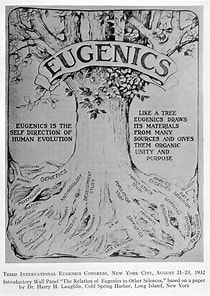The Dark Legacy of Eugenics in Medicine
Introduction
When we think of science, we often envision progress, innovation, and the pursuit of truth. However, history reveals a darker side where scientific theories have been manipulated to justify racism and discrimination. One of the most notorious examples is eugenics—a movement that aimed to improve the human race through selective breeding and often led to horrific consequences. How did science become entangled with such harmful ideologies? What are the lasting impacts of eugenics on medicine and society today? Buckle up as we journey through this unsettling history and uncover the ways in which science has perpetuated racism.
What is Eugenics?
Defining Eugenics
Eugenics is the scientifically flawed belief that the human population can be improved through controlled breeding. It emerged in the late 19th century, fueled by a misunderstanding of genetics and a misguided belief in racial superiority. Advocates sought to eliminate “undesirable” traits—ranging from physical disabilities to certain ethnic backgrounds—by promoting reproduction among those deemed “fit.”

Historical Context
The roots of eugenics can be traced back to the theories of Charles Darwin, particularly his ideas on natural selection. While Darwin’s work focused on evolution, some took his concepts out of context to justify social hierarchies based on race. This misinterpretation laid the groundwork for eugenic policies that would gain traction in the early 20th century.
The Rise of Scientific Racism
The Birth of Scientific Racism
Scientific racism refers to the misuse of scientific research to support racist ideologies. It emerged alongside eugenics and claimed that differences between races were rooted in biology rather than social constructs. This pseudo-science provided a veneer of legitimacy to discriminatory practices.
Key Figures in Scientific Racism
Several influential figures contributed to the development of scientific racism:
- Francis Galton: A cousin of Darwin, Galton coined the term “eugenics” and advocated for selective breeding.
- Carl Linnaeus: Linnaeus classified humans into different races based on physical characteristics, promoting a hierarchy that placed Europeans at the top.
- Havelock Ellis: His work on sexual psychology included racially charged theories about intelligence and morality.
Eugenics in America

Early 20th Century Policies
In the United States, eugenics gained popularity in the early 1900s. Influential organizations like the American Eugenics Society promoted sterilization laws aimed at people deemed “unfit.” These laws disproportionately targeted marginalized groups, including people with disabilities, people of color, and those living in poverty.
The Role of Medicine
Eugenicists infiltrated the medical community, advocating for sterilization and other interventions as “health measures.” Medical professionals often supported these policies under the guise of improving public health, leading to widespread abuses.
The Horrors of Eugenics
Forced Sterilizations
Racial Purity Laws
Eugenic thought also influenced laws aimed at maintaining racial purity. Anti-miscegenation laws prohibited interracial marriages, reinforcing societal divisions based on race.
The Nazi Connection
The Influence of American Eugenics
Nazi Germany’s eugenics program drew heavily from American practices. Influential American eugenicists collaborated with Nazi scientists, providing them with frameworks for racial purity policies that led to horrific outcomes during the Holocaust.
The Aftermath
The atrocities committed under Nazi eugenics discredited the movement globally. After World War II, there was a significant backlash against eugenic policies as societies grappled with their moral implications.
The Decline of Eugenics
Post-War Rejection
Following World War II, eugenics lost credibility as a legitimate scientific discipline. Many countries began dismantling sterilization laws and other eugenic practices. However, remnants of this ideology persisted in various forms.
Resurgence in Genetic Research
With advances in genetic research and technology, discussions around genetics resurfaced in new contexts. While modern genetics holds promise for understanding diseases and improving health outcomes, it also raises ethical questions about potential misuse.

Modern Implications: Genetic Testing and Discrimination
Genetic Testing Technologies
Today’s genetic testing technologies offer remarkable insights into health risks and ancestry. However, they also carry risks related to privacy and discrimination. For instance, insurance companies might use genetic information to deny coverage or charge higher premiums based on perceived risks.
Ethical Considerations
As we navigate this new landscape, ethical considerations must guide our use of genetic information. How do we ensure that advancements benefit everyone without perpetuating historical injustices?
Continuing Legacy: Racism in Science
Misuse of Scientific Research
Despite advances made since World War II, elements of scientific racism still persist today. For example, studies sometimes misinterpret genetic data, leading to unfounded claims about intelligence or behavior based solely on race. Such misrepresentations can reinforce harmful stereotypes and justify discriminatory practices.
Addressing Systemic Issues
To combat these issues effectively, it’s essential for scientists, policymakers, educators alike recognize how deeply ingrained biases influence research outcomes. By fostering inclusive environments within academia, we can work towards dismantling systemic racism embedded within scientific discourse.
Moving Forward: Lessons Learned
Embracing Diversity
The history of eugenics teaches us valuable lessons about diversity’s importance. Rather than viewing differences as deficiencies, we should celebrate them as strengths contributing richness complexity human experience.
Promoting Ethical Science
As we advance into an era defined by rapid technological growth, ethical considerations must remain at forefront scientific inquiry. Ensuring transparency accountability within research processes will help prevent past mistakes from repeating themselves.
Read This: The Unsettling Truth About Surveillance Capitalism: How Your Data is Exploited
Conclusion: Reflecting on Our Past
The dark legacy of eugenics serves as a sobering reminder that science can be wielded both as a tool for progress or oppression. By acknowledging this history, we empower ourselves to create a more equitable future where diversity is celebrated rather than feared. As we continue exploring new frontiers within medicine genetics, let’s commit ourselves fostering inclusivity ensuring everyone benefits from advancements made along way.
Meta Description
Explore how science perpetuated racism through the dark legacy of eugenics in medicine. Understand its historical context, impact, and ongoing consequences.
FAQs
- What is eugenics?
- Eugenics is a discredited theory advocating for improving human populations through selective breeding, often targeting marginalized groups.
- How did scientific racism influence eugenics?
- Scientific racism misused scientific research to support beliefs in racial superiority/inferiority, providing justification for eugenic practices.
- What were some consequences of forced sterilizations?
- Forced sterilizations led to significant trauma for individuals affected; many lost their reproductive rights without consent or knowledge.
- How has modern genetics been influenced by past eugenic practices?
- Modern genetics offers valuable insights but raises ethical concerns regarding privacy and potential discrimination based on genetic data.
- What steps can be taken to prevent repeating past mistakes?
- Promoting diversity within scientific fields and ensuring ethical guidelines govern research practices are crucial steps toward preventing historical injustices from recurring.


